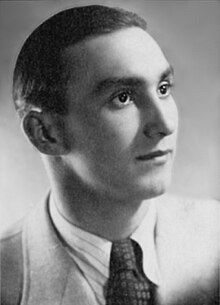Vasyl Tkachuk
This article includes a list of general references, but it lacks sufficient corresponding inline citations. (August 2013) |
Vasyl Tkachuk | |
|---|---|
 | |
| Born | 13 January 1916 Illintsi, Galicia and Lodomeria, Austria-Hungary (now Ukraine) |
| Died | 19 October 1944 (aged 28) East Prussia, Nazi Germany |
Vasyl Ivanovych Tkachuk (Ukrainian: Василь Іванович Ткачук; 13 January 1916 – 19 October 1944) was a Ukrainian writer, poet, and activist.
Biography
[edit]Vasyl Tkachuk was born in a very poor rural family to Ivan and Olena Tkachuk. He had two siblings, brother Oleksiy (born in 1904) and sister Mariya (born in 1912). Tkachuk's family lived in destitution, with a one chamber hut (about 16 m²) occupied by two families, ten people altogether. Following the deaths of Tkachuk's father and grandmother in 1921 the responsibility to provide for the family went to his mother, Olena.[1]
In 1922 Tkachuk started his education in a local primary school, which he finished in 1930. During this period he wrote his first poems.
Tkachuk led an active life, both socially and politically. He was interested in ethnography; was a member of local choreographic group "Prosvita" (ukr.: Просвіта) and a member of "Sel-Rob Ednist" (ukr.: Сель-Pоб Єдність) political group. At the age of 15 Tkachuk was arrested for drawing a caricature of Józef Piłsudski, though he was later released due to his young age. He was again arrested in 1922 for propaganda against the szlachta.[2]
In 1934 Tkachuk moved to Lviv where he published his novels in a local press. He was connected with a literary group of young writers and journalists called "The Twelve" (ukr.: "Дванадцятка").[3] In 1937 Tkachuk married Maria Janusz and 1938 their daughter Olha was born.
Following the Soviet annexation of Eastern Galicia and Volhynia, Tkachuk joined the Writer's Union of Ukraine, and became a student of Lviv University (ukr: Львівський університет).[4] In 1941 Tkachuk joined to Red Army and was killed during the East Prussian Offensive.[5]
Works
[edit]Rural families, their habits, culture, everyday life had a great influence on Tkachuk’s works, where he often described life of the local society. Tkachuk is compared to Vasyl Stefanyk for using Hutsul dialect in his works.[6]
- 1933: Великдень іде
- 1935: Весілля на Покутті – published in "Життя і знання" magazine, No. 97 (10)
- 1935: Сині чічки, збірка новел (a collection of short stories)
- 1936: Золоті дзвінки, збірка новел (a collection of short stories)
- 1938: Зимова мелодія, збірка новел (a collection of short stories)
- 1940: Весна, збірка новел (a collection of short stories)
- 1973: Новели, збірка (a collection of short stories)
References
[edit]- ^ В. Ткачук, "Зимова мелодія", Львів (Lviv), 1936
- ^ ЦДІА у Львові Фонд 205 оп. 1 справа 704
- ^ Галичина, 13 September 2001, p. 10
- ^ Вільде І. Василь Ткачук: " Золоті дзвіночки", Незбагне серце, Львів (Lviv) 1990, p.224-227
- ^ Хороб С. "Слово. Образ. Форма. У пошуках художності. Своєрідність новелістики Василя Ткачука", Плай, 2000
- ^ В. Лучук, Письменник-демократ, Львів (Lviv), 1973
Other sources
[edit]- Вільде, Ірина. Незбагненне серце. Львів: Каменяр, 1990. pp. 225–227.
- Гординський, Ярослав. Літературна критика підсовєтської україни. Львів-Київ, 1939.
- Грицков’ян, Ярослав. Українські письменники міжвоєнного двадцятиліття. Львів, 1994.
- Карманський, Петро. Українська богема. Львів: Олір, 1996. ISBN 5-7702-0985-2.
- Курдидик, Анатоль. Богдан з іншого боку. Спроба портрету цього мого близького друга. Терем: проблеми української культури. Детройт, 1971. No. 4. pp. 19–30
- Лучук, В. Письменник-демократ. Львів, 1973.
- Огієнко, Іван. Ткачук Василь: Зимова мелодія//Рідна мова. 1939.
- Рудницький М. Ткачук Василь: Весна// Література і мистецтво. 1940 No. 1.
- Хороб, Степан Іванович. Слово- образ- форма: у пошуках художності. Івано-Франківськ: Плай, 2000. ISBN 966-7365-68-9.
- Тарнавський, Остап. Літературний Львів 1939-1944. Львів: Просвіта, 1995.
